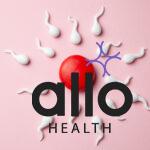The Link Between Vitamin D and Premature Ejaculation

Allo Health is dedicated to personalized well-being, offering support and trusted information tailored to individual health goals. The platform emphasizes human-generated content, led by a distinguished medical team of experts, including physicians and sexual health specialists. Their commitment to credibility involves rigorous fact-checking, authoritative research, and continuous updates to ensure accurate, up-to-date information. Allo Health's unique approach goes beyond conventional platforms, providing expert-led insights and a continuous commitment to excellence, with user feedback playing a crucial role in shaping the platform's authoritative voice.

Dr Sanina Mansoor holds MBBS degree from Yenepoya university,Mangalore.She has 8 years of experience working as a medical officer at various health centres and medical colleges.
Why This Was Upated?
Our experts continually monitor the health and wellness space, and we update our articles when new information became available.
Updated on 06 June, 2024
- Article was updated as part of our commitment to diversity, equity, and inclusion.

"The following blog article provides general information and insights on various topics. However, it is important to note that the information presented is not intended as professional advice in any specific field or area. The content of this blog is for general educational and informational purposes only.
Book consultation
The content should not be interpreted as endorsement, recommendation, or guarantee of any product, service, or information mentioned. Readers are solely responsible for the decisions and actions they take based on the information provided in this blog. It is essential to exercise individual judgment, critical thinking, and personal responsibility when applying or implementing any information or suggestions discussed in the blog."
Premature ejaculation can be a frustrating and embarrassing concern for men, affecting their sexual performance and confidence. While there are various causes of premature ejaculation, recent studies have highlighted the role of vitamin D deficiency in this sexual dysfunction. In this article, we will explore how vitamin D affects sexual health and the potential benefits of vitamin D supplementation for treating premature ejaculation.
What Is Vitamin D?
Vitamin D is a fat-soluble vitamin that plays a crucial role in various physiological processes within the human body. It is essential for maintaining proper bone health, supporting the immune system, and regulating calcium and phosphorus levels in the blood. There are two main forms of vitamin D that are important for humans: vitamin D2 (ergocalciferol) and vitamin D3 (cholecalciferol).
- Sources:
- Sunlight: The skin can produce vitamin D when exposed to ultraviolet B (UVB) rays from the sun. Sunlight is a natural source of vitamin D synthesis in the body.
- Diet: Some foods contain vitamin D, including fatty fish (such as salmon and mackerel), fish liver oils, fortified dairy products, fortified cereals, and egg yolks.
- Synthesis in the Body:
- When the skin is exposed to UVB rays from sunlight, a cholesterol compound in the skin is converted into vitamin D3.
- Vitamin D3 can also be obtained from animal-based food sources or supplements.
- Activation and Metabolism:
- Once vitamin D is obtained, it undergoes several steps of activation and metabolism in the liver and kidneys to form its active hormonal form, calcitriol.
- Calcitriol is the biologically active form of vitamin D that interacts with receptors in various tissues to regulate calcium and phosphorus metabolism.
- Functions:
- Bone Health: Vitamin D is crucial for the absorption of calcium and phosphorus in the intestines, promoting bone mineralization and growth. It helps prevent conditions like rickets in children and osteomalacia in adults.
- Immune System Support: Vitamin D plays a role in modulating the immune system and may contribute to the body’s defense against infections and autoimmune diseases.
- Cell Growth and Regulation: Vitamin D is involved in cell differentiation, proliferation, and apoptosis, which are essential processes for maintaining healthy tissues and preventing the development of certain cancers.
- Deficiency:
- Vitamin D deficiency can lead to health concerns, including bone disorders like rickets in children and osteoporosis in adults.
- Individuals at risk of deficiency include those with limited sun exposure, older adults, individuals with darker skin, and people with certain medical conditions that affect vitamin D absorption.
- Supplementation:
- In cases where it is challenging to obtain sufficient vitamin D through sunlight and diet, supplements may be recommended under the guidance of a healthcare professional.
It’s important to note that while vitamin D is crucial for health, excessive intake can lead to toxicity. Therefore, it’s essential to balance vitamin D intake through a combination of sunlight exposure, a healthy diet, and, if necessary, supplementation, guided by healthcare recommendations.
Vitamin D Uses & Benefits
Vitamin D is a multifunctional nutrient with a range of uses and benefits in the human body. Here are detailed explanations of its various roles:
- Bone Health:
- Calcium Absorption: Vitamin D is essential for the absorption of calcium in the intestines. Adequate calcium absorption is crucial for maintaining strong and healthy bones.
- Prevention of Rickets and Osteomalacia: Vitamin D deficiency can lead to conditions like rickets in children and osteomalacia in adults, characterized by weakened and soft bones. Ensuring sufficient vitamin D helps prevent these disorders.
- Muscle Function: Vitamin D is believed to play a role in muscle function. A deficiency may contribute to muscle weakness and pain.
- Immune System Support: Vitamin D is involved in the modulation of the immune system. It has been linked to the prevention of respiratory infections, autoimmune diseases, and other immune-related disorders.
- Cardiovascular Health: Some studies suggest that adequate levels of vitamin D may be associated with a lower risk of cardiovascular diseases. It may help in regulating blood pressure and reducing inflammation.
- Cancer Prevention: Research indicates that vitamin D may have a role in reducing the risk of certain cancers, including breast, prostate, and colon cancers. However, more research is needed to establish definitive links.
- Mood and Mental Health: There is some evidence suggesting that vitamin D may have a role in mood regulation and mental health. Deficiency has been associated with conditions like seasonal affective disorder (SAD) and depression.
- Autoimmune Diseases: Vitamin D is thought to play a role in preventing or managing autoimmune diseases, such as multiple sclerosis, rheumatoid arthritis, and type 1 diabetes.
- Diabetes Management: Some studies suggest that vitamin D may contribute to better insulin sensitivity and glucose metabolism, potentially benefiting individuals with type 2 diabetes.
- Weight Management: There is ongoing research into the relationship between vitamin D and weight management. Some studies suggest that adequate vitamin D levels may be associated with a healthier body weight.
- Anti-inflammatory Effects: Vitamin D has anti-inflammatory properties, and maintaining sufficient levels may help modulate inflammation in the body.
- Pregnancy and Fetal Development: Adequate vitamin D is crucial during pregnancy for proper fetal development, including bone formation. It may also contribute to a healthy pregnancy and reduce the risk of complications.
- Skin Health: Vitamin D is involved in skin cell growth and repair. It may contribute to overall skin health and may play a role in conditions like psoriasis.
It’s important to note that while vitamin D has numerous potential benefits, excessive intake can lead to toxicity. The optimal level of vitamin D varies among individuals, and it’s recommended to consult with healthcare professionals for personalized advice, especially if considering supplementation. Achieving a balance through a combination of sunlight exposure, a vitamin D-rich diet, and, if necessary, supplements is key to reaping the benefits of this essential nutrient.
Vitamin D Side Effects & Precautions
While vitamin D is crucial for various physiological functions, excessive intake can lead to toxicity, resulting in side effects. Here are details about vitamin D side effects and precautions:
Side Effects of Excessive Vitamin D:
- Hypercalcemia: The most common side effect of vitamin D toxicity is elevated levels of calcium in the blood (hypercalcemia). This can lead to symptoms such as nausea, vomiting, weakness, confusion, and, in severe cases, kidney damage.
- Calcification of Soft Tissues: Excess vitamin D can cause calcium to accumulate in soft tissues, leading to calcification. Organs such as the kidneys, heart, and blood vessels may be affected.
- Kidney Damage: Prolonged hypercalcemia can contribute to kidney damage or the formation of kidney stones.
- Gastrointestinal Concerns: High doses of vitamin D supplements may cause digestive concerns, including nausea, vomiting, and diarrhea.
- Dehydration: Excessive vitamin D can contribute to dehydration due to increased urinary output.
- Weakness and Fatigue: High levels of vitamin D can lead to generalized weakness and fatigue.
Precautions and Considerations:
- Consultation with Healthcare Professionals: Before starting any vitamin D supplementation regimen, it is crucial to consult with a healthcare professional. They can assess individual needs based on factors like age, health status, and existing medical conditions.
- Monitoring Vitamin D Levels: Regular monitoring of vitamin D levels through blood tests helps ensure that supplementation is within the optimal range. This can help prevent both deficiency and toxicity.
- Dietary Sources: Whenever possible, obtaining vitamin D through natural dietary sources and sunlight exposure is preferable to supplementation. Foods rich in vitamin D include fatty fish, fortified dairy products, and egg yolks.
- Sun Exposure: While sunlight is a natural source of vitamin D, excessive sun exposure without adequate protection can lead to other health risks, such as skin damage and an increased risk of skin cancer. It’s important to strike a balance and use sunscreen as needed.
- Age Considerations: Infants and elderly individuals are often more susceptible to vitamin D deficiency or toxicity. Special care should be taken when supplementing these populations.
- Underlying Medical Conditions: Individuals with certain medical conditions, such as hyperparathyroidism, sarcoidosis, or kidney disease, may be more prone to vitamin D toxicity. A healthcare professional should carefully monitor and adjust supplementation in such cases.
- Pregnancy and Breastfeeding: Pregnant or breastfeeding women should follow healthcare provider recommendations for vitamin D supplementation to support both maternal and infant health.
- Medication Interactions: Some medications, such as certain anticonvulsants and glucocorticoids, can interact with vitamin D metabolism. Healthcare professionals should be informed of all medications being taken.

It’s important to emphasize that vitamin D toxicity is rare and is more likely to result from excessive supplementation rather than from dietary sources or sunlight exposure. Following recommended guidelines, regular check-ups, and seeking guidance from healthcare professionals can help ensure the safe and effective use of vitamin D for overall health.
The Link Between Vitamin D and Premature Ejaculation
There is limited direct scientific evidence establishing a clear link between vitamin D levels and premature ejaculation. Premature ejaculation (PE) is a complex condition influenced by psychological, physiological, and neurobiological factors. While some studies have explored the role of vitamin D in sexual health and function, the research is still in its early stages, and more studies are needed to draw definitive conclusions.
Here are some considerations regarding the potential link between vitamin D and premature ejaculation:
- Limited Research: The available research on the relationship between vitamin D and premature ejaculation is limited, and existing studies often have small sample sizes or methodological limitations.
- Sexual Health and Vitamin D: Vitamin D has been associated with various aspects of reproductive and sexual health, including the production of sex hormones and sperm quality. However, the specific impact on premature ejaculation is not well-established.
- Neurotransmitter Regulation: Vitamin D receptors are present in various tissues, including the brain. Some studies have suggested that vitamin D may play a role in neurotransmitter regulation, and this could potentially influence sexual function.
- Psychological Factors: Premature ejaculation can be influenced by psychological factors such as anxiety, stress, and depression. Vitamin D has been implicated in mood regulation, and addressing vitamin D deficiency may indirectly impact psychological factors associated with sexual function.
- Hormonal Influence: Vitamin D is involved in the regulation of sex hormones, including testosterone. Hormonal balance is essential for normal sexual function, but the specific relationship with premature ejaculation requires further investigation.
- Overall, Health Impact: Vitamin D deficiency has been linked to various health conditions, and maintaining overall health is crucial for sexual well-being. Addressing any nutritional deficiencies, including vitamin D, may contribute to overall health improvements.
It’s essential to approach the topic with caution, as individual responses to vitamin D supplementation can vary, and premature ejaculation is a complex condition with multifactorial causes.
If you are experiencing concerns related to premature ejaculation, it is advisable to consult with a healthcare professional or a urologist. They can conduct a thorough evaluation, consider various contributing factors, and provide guidance on appropriate interventions or treatments.
As research in this area is ongoing, it’s recommended to check for the latest scientific literature and consult with healthcare professionals for the most up-to-date information on the potential link between vitamin D and premature ejaculation.
Most Asked Questions
-
Is there a direct link between vitamin D tiers and untimely ejaculation?
While studies on this particular link is restricted, vitamin D has been associated with diverse factors of reproductive fitness. Adequate tiers may additionally make contributions to ordinary nicely-being, doubtlessly impacting factors related to untimely ejaculation. However, conclusive proof remains missing, and more studies is wanted.
-
Can nutrition D deficiency contribute to premature ejaculation?
Vitamin D deficiency has been related to diverse fitness troubles, and preserving typical fitness is vital for sexual well-being. Addressing nutritional deficiencies, which include diet D, might also circuitously impact elements along with strain, anxiety, and hormonal stability, which could influence untimely ejaculation.
-
Does diet D supplementation improve sexual function and reduce untimely ejaculation?
While vitamin D performs a function in reproductive health, there's confined proof at once linking supplementation to advanced sexual feature or decreased untimely ejaculation. It's vital to method such concerns holistically, thinking about different factors consisting of psychological well-being, hormonal stability, and typical fitness.
-
How does vitamin D have an effect on hormones related to sexual feature?
Vitamin D is concerned inside the regulation of intercourse hormones, including testosterone. Hormonal stability is crucial for normal sexual characteristic, and keeping adequate diet D degrees may additionally make contributions to normal hormonal fitness. However, the precise impact on premature ejaculation isn't properly-mounted.
-
Should individuals with premature ejaculation take into account diet D dietary supplements?
Consulting with a healthcare professional is critical earlier than thinking about any dietary supplements for premature ejaculation. While addressing vitamin D deficiency may make contributions to basic health enhancements, there's inadequate evidence to endorse nutrition D supplementation as an immediate answer for untimely ejaculation. A healthcare professional can offer personalised recommendation primarily based on an intensive evaluation of man or woman health factors.






































